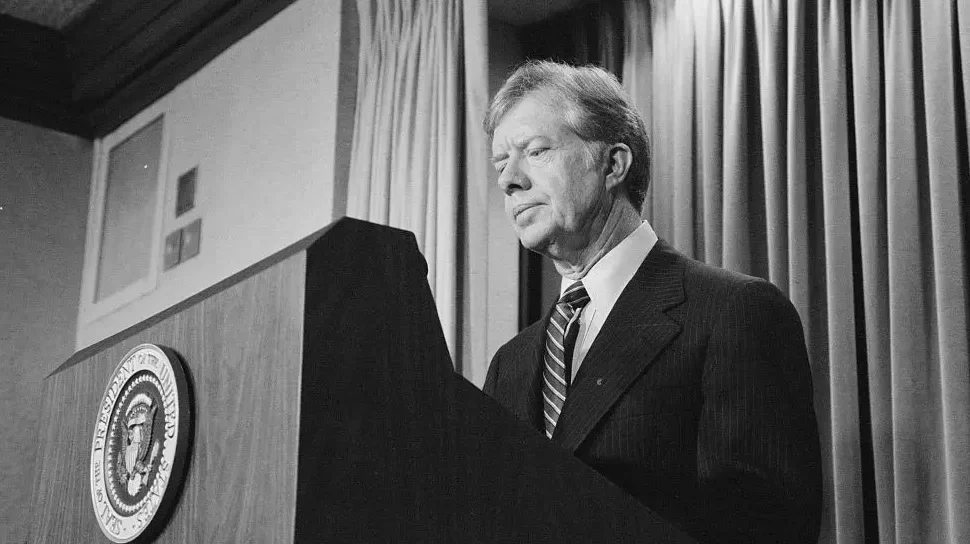|
Getting your Trinity Audio player ready...
|
President Jimmy Carter’s 1979 address, often mislabeled as the “Malaise Speech,” demands a more thoughtful reading than history has afforded it. Officially titled the “Crisis of Confidence,” this speech stands as one of the most profound—and prophetic—presidential messages in modern American history. Delivered during an era of rising inflation, fuel shortages, and national discontent, Carter’s words sought to transcend immediate crises, addressing something deeper and far more enduring.
From the White House, Carter spoke after an unprecedented retreat to Camp David, where he consulted a cross-section of Americans—politicians, clergy, scholars, and everyday citizens—on the nation’s direction. His planned remarks were shelved, replaced by a heartfelt address that few politicians dare to deliver.
“It is a crisis that strikes at the very heart and soul and spirit of our national will,” Carter declared, naming the disillusionment that many Americans had yet to articulate. Eschewing the polished optimism that politicians often use to paper over uncomfortable truths, Carter offered candor over convenience. He didn’t deliver empty platitudes or promise easy fixes. Instead, he diagnosed the root causes of America’s malaise: a profound loss of purpose, trust, and unity.
Carter’s speech wasn’t merely about oil prices or gas lines—though these were tangible symptoms of the broader problem. He saw them as manifestations of a deeper spiritual crisis, driven by the unchecked pursuit of material wealth. “Too many of us now tend to worship self-indulgence and consumption,” he observed. “Human identity is no longer defined by what one does, but by what one owns.” Delivered over four decades ago, these words resonate powerfully in today’s world of endless scrolling, curated social media personas, and the relentless pursuit of likes and followers.
But Carter didn’t stop at critique. He offered solutions grounded in shared sacrifice and collective responsibility. “All the legislation in the world can’t fix what’s wrong with America,” he admitted, placing the burden of renewal squarely on the shoulders of the American people. He framed energy independence not merely as an economic necessity but as a moral imperative. His bold proposals to reduce reliance on foreign oil and invest in renewable energy sources reflected a vision far ahead of its time—one largely ignored by both his contemporaries and successors.
“We are the generation that will win the war on the energy problem and, in that process, rebuild the unity and confidence of America,” Carter declared. But his optimism came with a challenge. He urged Americans to think beyond immediate comforts and rediscover a higher purpose. “We are at a turning point in our history. There are two paths to choose. One is the path I’ve warned about tonight—the path that leads to fragmentation and self-interest. Down that road lies a mistaken idea of freedom: the right to grasp for ourselves some advantage over others.”
In hindsight, Carter’s speech was startlingly prescient. The unchecked consumerism he lamented has metastasized into a culture of debt, environmental degradation, and social fragmentation. His plea for energy independence remains as urgent as ever in the face of climate change and the geopolitical instability tied to fossil fuel dependence. Carter warned us, with clarity that grows sharper in retrospect, that ignoring these challenges would exact a heavy toll.
Yet Carter’s honesty was met with skepticism, and his speech became a political albatross. Critics branded him a pessimist, and the country’s political winds soon shifted toward Ronald Reagan’s sunny optimism. But Carter wasn’t selling easy answers. He was offering the hard truth: real strength comes not from pretending our weaknesses don’t exist but from confronting them head-on.
Carter’s speech endures as a blueprint for principled leadership—leadership grounded in integrity rather than expediency. He didn’t tell Americans what they wanted to hear; he told them what they needed to hear. His words remain a challenge to all of us—then and now—to rediscover the soul of our nation.
How far have we come since that July evening? And how much farther might we have gone had we listened? These are questions worth asking, especially today, when the “crisis of confidence” Carter described feels less like a historical artifact and more like a headline.















































